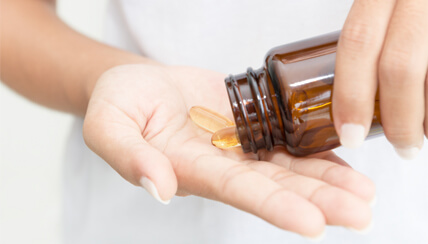Walk into any drug store or health food store and you'll see shelves of multivitamins promising to keep you healthy and strong. Should you take one and if so, how do you decide which is the best one for you?
In general if you eat 5-9 servings of fruits and vegetables every day, along with whole grains and low-fat dairy products, you may not need to take a supplement.
If you decide to take a multivitamin, look for one that meets the following criteria:
 100 percent or more of the Daily Value (DV) for most vitamins and minerals
100 percent or more of the Daily Value (DV) for most vitamins and minerals
More isn't necessarily better - avoid products that have 10,000 or more International Units (IU) of vitamin A and/or 1,000 or more IU of vitamin E - both of these vitamins are fat-soluble meaning your body can store them and too much in your body can be dangerous
If you are a pre-menopausal woman, look for a multivitamin that has 18 milligrams of iron; men and post-menopausal women need 8-10 milligrams per day
If you take a medication to thin your blood or if you have ever been advised to watch your vitamin K intake, check with your doctor to see how much is safe to take in a multivitamin
If a multivitamin does not contain 100 percent of the DV of calcium, don't worry about it - try to eat foods rich in calcium (dairy products and leafy green vegetables) or take a separate calcium supplement
Remember - it's always best to get vitamins and minerals from food. Use a multivitamin as a supplement, not as a replacement.
This information has been approved by Emily McCloud, MS, RD (June 2012).